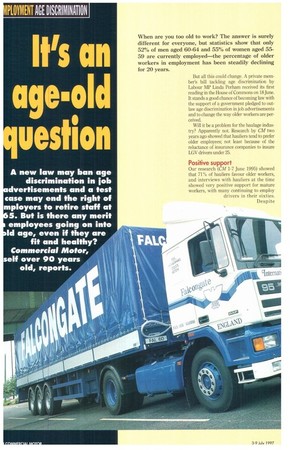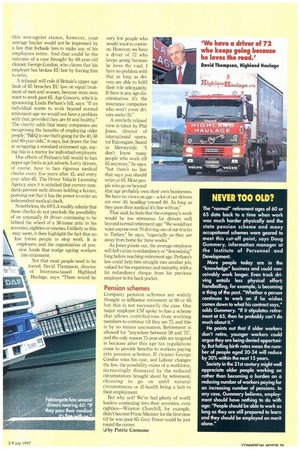A new law may ban age discrimination in job dvertisements
Page 40

Page 41

If you've noticed an error in this article please click here to report it so we can fix it.
and a test case may end the right of mployers to retire staff at 5. But is there any merit employees going on into Id age, even if they are fit and healthy? Commercial Motor, self over 90 years old, reports.
When are you too old to work? The answer is surely different for everyone, but statistics show that only 52% of men aged 60-64 and 55% of women aged 5559 are currently employed—the percentage of older workers in employment has been steadily declining for 20 years.
But all this could change. A private member's bill tackling age discrimination by Labour MP Linda Perham received its first reading in the House of Commons on 18 June. It stands a good chance of becoming law with the support of a government pledged to outlaw age discrimination in job advertisements and to change the way older workers are perceived.
Will it be a problem for the haulage industry? Apparently not. Research by CM two years ago showed that hauliers tend to prefer older employees; not least because of the reluctance of insurance companies to insure WV drivers under 25.
Positive support Our research (CM 1-7 June 1995) showed that 71% of hauliers favour older workers, and interviews with hauliers at the time showed very positive support for mature workers, with many continuing to employ
drivers in their sixties.
Despite this non-ageist stance, however, your average haulier would not be impressed by a law that forbade him to make any of his employees retire. And that could be the outcome of a case brought by 68-year-old cleaner, George Condon, who claims that his employer has broken EU law by forcing him to retire.
A tribunal will rule if Britain's upper age limit of 65 breaches EU law on equal treatment of men and women, because more men want to work past 65. Age Concern, which is sponsoring Linda Perham's bill, says: "If an individual wants to work beyond normal retirement age we would not have a problem with that, provided they are fit and healthy." The charity adds that many companies are recognising the benefits of employing older people: "B&Q is one that's going for the 40,50 and 60-year-olds," it says, but draws the line at scrapping a standard retirement age, saying this is a matter for individual employers.
One effects of Perham's bill would to ban upper age limits in job adverts. Lorry drivers, of course, have to face rigorous medical checks every five years after 45, and every year after 65. The Driver Vehicle Licensing Agency says it is satisfied that current standards prevent unfit drivers holding a licence, pointing out that it has the power to order an independent medical check.
Nonetheless, the DVLA readily admits that these checks do not preclude the possibility of an unusually fit driver continuing to be behind the wheel of a 38-tonne artic in his seventies, eighties or nineties. Unlikely as this may seem, it does highlight the fact that no law forces people to stop work. It is employers and the organisation of pension funds that nudge ageing workers into retirement.
Not that most people need to be forced. David Thompson, director of Inverness-based Highland very few people who would want to continue. However, we have a driver of 72 who keeps going because he loves the road. I have no problem with that as long as drivers are able to fulfil their role adequately. If there is any age discrimination it's the insurance companies who won't cover drivers under 25."
A similarly relaxed view is taken by Phil Jones, director of international operator Falcongate, based in Merseyside. "I don't know many people who work till 65 anymore," he says, "but there's no law that says you should retire at 65. Most people who go on beyond that age probably own their own businesses. We have no views on age—a lot of our drivers are over 50, heading toward 60. As long as they pass their medical it's fine with us."
That said, he feels that the company's work would be too strenuous for drivers well beyond normal retirement age: "We would not want anyone over 70 driving one of our trucks to Turkey," he says, "especially as they are away from home for three weeks."
As Jones points out, the average employee will fall victim to redundancy or "downsizing" long before reaching retirement age. Perham's law could help him straight into another job, valued for his experience and maturity; with a fat redundancy cheque from his previous employer in his back pocket.
Pension schemes
Company pension schemes are widely thought to influence retirement at 60 or 65 but this is not necessarily the case. One major employer CM spoke to has a scheme that allows contributions from working members to continue till they are 75, and this is by no means uncommon. Retirement is allowed for "anywhere between 50 and 75", and the only reason 75-year-olds are targeted is because after this age tax regulations cease to provide benefits to workers paying into pension schemes. If cleaner George Condon wins his case, and Labour changes the law, the possibility exists of a workforce, increasingly dismayed by the reduced circumstances brought about by retirement, choosing to go on until natural circumstances or ill-health bring a halt to their employment.
But why not? We've had plenty of world leaders continuing into their seventies, even eighties—Winston Churchill, for example, didn't become Prime Minister for the first time till he was past 65. Grey Power could be just round the corner.
0 by Patric Cunnane








































































































